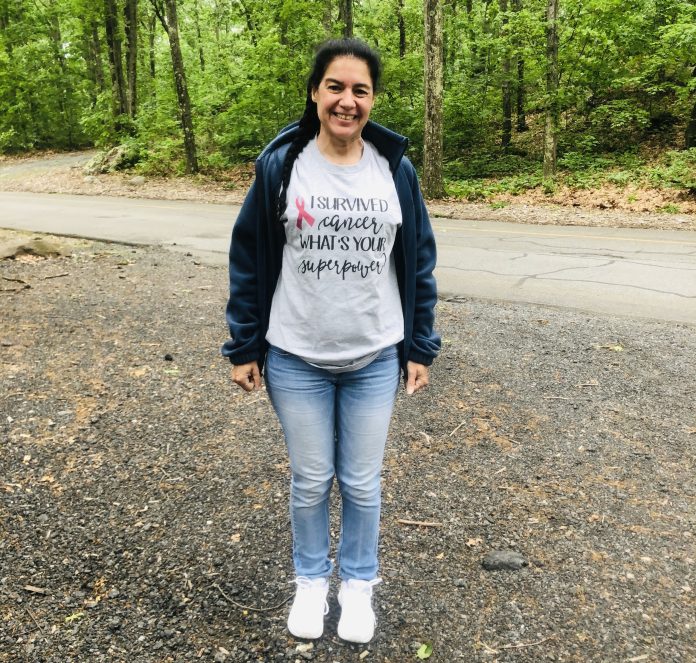
By Geena Monahan—For the North Star Reporter
Susan LaFratta, a North Attleborough resident for over 35 years, has faced cancer numerous times throughout her life – both of her parents battled lung cancer, and her maternal aunt had breast cancer – and she knew the guidelines and importance of screening.
What LaFratta didn’t know, and learned first-hand when she was diagnosed with breast cancer at age 49, was that mammograms aren’t the only option for diagnosing the early forms, and out-of-pocket costs of additional screenings and tests can create unexpected financial burdens.
“I’m very thankful – they caught it quickly, it didn’t spread, and I’m still here,” said LaFratta.
Following traditional medical guidance, LaFratta went for her first mammogram at age 46 at Sturdy Memorial Hospital in Attleboro. However, due to an issue with her pectoral muscle, LaFratta experienced extreme pain and collarbone bruising that lasted for nearly four weeks after the procedure.
LaFratta and her doctor decided breast MRIs were a better option, and she went in for an MRI two years after her first mammogram. It was after this visit she learned of a “focus” – the medical term used for when a small lesion is spotted on imaging – in her right breast that measured 3 millimeters.
A biopsy found that it was benign, but her doctor suggested a second MRI six months later. This time, LaFratta received news that a 4-millimeter focus had been found on her left breast. Neither LaFratta nor her doctor could feel the lump, and a tumor couldn’t be located when a biopsy was attempted.
After two MRIs and two biopsies, LaFratta was unsure if she should continue spending more time or money on further testing. However, a family friend and oncologist suggested a different procedure, one called an MRI-needle guided biopsy. It was after this that LaFratta learned she had breast cancer.
“I was hesitant because the money was starting to add up for all of these tests – those are not covered by insurance,” said LaFratta. “A mammogram is covered, but not MRIs, so I had to pay out of pocket for all of this.”
LaFratta received her breast cancer diagnosis on a Friday, and underwent surgery at Norwood Hospital the following Wednesday. Doctors told LaFratta that because they found the cancer at an early stage where it had not spread to her lymph nodes, her treatment would require seven weeks of radiation, but no chemotherapy.
Five years later, LaFratta remains in remission.
“When they took that ‘focus’ out, it was 7 millimeters, yet I still couldn’t feel it. It was right against my chest wall,” said LaFratta. “I’m very thankful that I wasn’t having mammograms because if I was, they wouldn’t have found it for a couple more years.”
Another hurdle LaFratta didn’t anticipate was fighting cancer during a pandemic – just two weeks after her surgery on March 4, 2020, the world shut down. She attended all radiation treatments and follow-up appointments alone and stayed home as much as possible. LaFratta even declined an invite to a neighbor’s outdoor wedding, as the risk of contracting COVID-19 and having to miss her radiation appointments was too high.
Despite the challenges she faced in receiving her diagnosis and during treatment, LaFratta remains grateful for an “easier” experience than some women with cancer face, and for a job that provided financial stability and flexibility.
At the time, LaFratta was working at Castechnologies, Inc., a local Attleboro business where she had been employed for over 25 years. The company paid her in full throughout her treatment, allowing her to leave early each day at 2 p.m. for the seven weeks she needed to attend radiation appointments.
Although LaFratta’s insurance, MassHealth for businesses, did not cover all the initial testing, it did cover surgery and radiation – another perk of her job for which she was thankful.
“I was okay financially, but what about people that aren’t?” asked LaFratta. “People who work paycheck to paycheck, how would they do that if they have to leave work for hours every day?”
Raising awareness and funds for breast cancer screenings and testing remains deeply important to LaFratta, and she walks in either the Relay for Life of Greater Attleboro at Norton High School or another local event each year. She first participated years ago in honor of family members who had cancer, but as a survivor, the walk carries a new meaning.
LaFratta, who is involved with Scouting America, said North Attleborough’s Troop 33 also participates in the Relay for Life under the team name “Scout for a Cure.”
Looking back on her experience, if LaFratta could share one message with women in their 30s and 40s it would be this – Don’t wait, don’t skip screenings, and don’t be afraid to seek a second opinion.
“I think testing is so huge – go and get tested,” said LaFratta. “Don’t wait. If you feel something – even if you don’t – go and get tested.”
